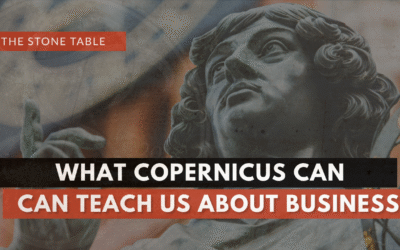When You’re the Most Important Person in the Room, Serve | David Wigington

Imagine walking into a room this morning, looking around, and realizing, I am the most important person here. I don’t know who that is today. Maybe it’s Adam, whose church in Greenfield is thriving. Or perhaps Jameson, who ran for Congress. Micah, who’s running for Lieutenant Governor. Dave Cooper, who kickstarted the business engine funding the Stone Table. Eric, the president of Stone Table. Or any of the pastors here. We could debate who’s most important, and many of us would defer to one another.
But think of Jesus at the Last Supper. There was no question—He was the most important person in that room. And what did He do? He wrapped a towel around His waist, knelt down, and washed His disciples’ feet. He served in the humblest way possible.
From Jesus, we learn two things: When you realize you’re the most important person in the room, serve. When you realize you have the authority to make people do anything, call them to the Great Commission. In Matthew 28:18-19, before Jesus commanded, “Go and make disciples of all nations,” He reminded them, All authority in heaven and on earth has been given to me. With ultimate power, Jesus chose to serve and to commission others to make disciples.
When we gather as leaders—whether pastors or business professionals—there can be an unspoken tension. How many people did you have last Sunday? How much was your bottom-line revenue last year? We subtly measure ourselves. But in every room, Jesus holds the highest authority, and He uses it to serve and to send us.
The Great Commission applies equally to us all. There isn’t one version for pastors and another for business leaders. We’re each called to make disciples. This is where the church and marketplace intersect. What can church leaders learn from business leaders, and vice versa? Let’s explore.
Here are four lessons pastors can learn from the marketplace:
- Partnership and Cooperation Make the World Go Round: Businesses often collaborate with competitors if it’s mutually beneficial, as seen in NASCAR sponsorships. Churches, on the other hand, tend to be protective and competitive, often seeing ministry as a zero-sum game. Partnerships among churches can expand God’s kingdom rather than compete for limited resources.
- Excellence Matters: A business that doesn’t produce quality won’t survive. The church’s message deserves the highest standard of excellence too. We have the greatest story, but the world has superior technology, resources, and execution. Church leaders should strive for excellence to reflect the importance of our mission.
- Deliver a Well-Executed Product On Time: Business thrives on punctuality and efficiency. Many churches overlook this—starting services late or leaders arriving late to meetings. Timeliness communicates respect for others’ time.
- Measurables Aren’t the Enemy: Businesses track ROI to measure success. Churches often hesitate to measure progress because we’re in the “people business.” However, creating Kingdom profit means holding ourselves accountable and assessing if we’re achieving our mission.
And here are four things marketplace leaders can learn from the church:
- Relational Currency Over Financial Currency: The church functions on relationships. Business leaders can learn to balance profit and relationships, understanding that relational currency can lead to trust and long-term success.
- The Bottom Line Isn’t the Only Bottom Line: A multiple bottom line that includes community impact is now standard in business. Churches exist to make disciples, not profit. Businesses can adopt this mindset, focusing on community contributions alongside financial gain.
- Strong Leaders Are in Your Congregation: Many talented leaders are volunteering in churches, leading teams and managing projects. Business leaders can learn from these individuals who motivate and manage without financial incentive.
- There’s No Substitute for Passion and Calling: Church leaders are often driven by a calling, willing to sacrifice for a higher purpose. Marketplace leaders should seek the same passion for their work, viewing their vocation as sacred.
To circle back, whether you’re the most influential business person or the largest church pastor in the room, ask yourself: What will I do with this power? Jesus shows us: serve others. When you have the authority to influence others, lead them to the Great Commission.
So, let’s reflect on how church and marketplace can together pursue our shared mission to make disciples. In a moment, Bill will come up to help us engage in this conversation further. Here’s a list to get us started: four things marketplace people can learn from pastors, and four things pastors can learn from marketplace leaders. Remember, our ultimate aim isn’t about who’s more powerful. It’s about serving and living out our calling to make disciples across all nations.




